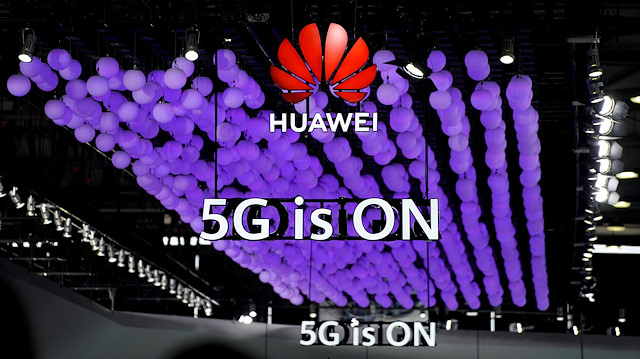
Head of MI5 also waded into the debate, insisting UK is capable of handling any potential security threats
The U.S. officials told the British government on Monday that allowing Huawei a role in building super-fast 5G networks across the country could jeopardize intelligence sharing between the two countries.
They also said using Chinese technology would be “nothing short of madness,” showing U.K. officials a secret document they claimed contained fresh evidence of potential security threats arising from the use of Huawei technology.
“We have strict controls over how Huawei equipment is currently deployed in the U.K. The government is undertaking a comprehensive review,” Prime Minister Boris Johnson’s spokesman told local media. “There is a meeting today which involves U.S., U.K. government counterparts in national security and telecoms.”
The delegation was led by Matt Pottinger, Trump’s deputy national security advisor, underscoring how seriously the White House takes the issue. The Guardian reported that despite initial reports suggesting the U.S. delegation would only meet with civil servants, they in fact spoke with at least one Cabinet minister.
Last year, the British Cabinet voted 5-4 in favor of Huawei. The decision was and is controversial; then-Defense Minister Gavin Williamson was accused of leaking the result of the vote and was sacked as a result. Williamson was one of those worried about potential security threats. On the other hand, last July, parliament’s Science and Technology Committee also came out in support of working with Huawei.
Johnson is due to make a decision on the subject in the coming weeks. Local media expect him to allow Huawei to take part in the 5G rollout. This will likely be in building so-called “non-core technology,” such as cellphone masts and radio antenna networks.
- MI5 vs CIA
Johnson has tried to allay U.S. fears nonetheless, saying at last year’s NATO summit in London: “We cannot prejudice our vital national security interests, nor can we prejudice our ability to cooperate with other Five Eyes security partners [U.S., Canada, New Zealand, and Australia]. That will be the key criterion that informs our decision about Huawei.”
British intelligence services have consistently argued that any security threats can be easily contained, and this last weekend MI5 chief Andrew Parker told the Financial Times that he had “no reason to think” intelligence sharing with the U.S. would be compromised if the U.K. signed a deal with Huawei.
He went on to say that the U.S.-U.K. intelligence sharing relationship was “very close and trusted.”
“It is, of course, of great importance to us. And, I dare say, to the U.S. too, though that’s for them to say. It is a two-way street,” he said.
“Perhaps the thing that needs more focus and more discussion is how do we get to a future where there’s a wider range of competition and a wider range of sovereign choices than defaulting to a yes or no about Chinese technology,” he said.
It is rare for the British head of intelligence to make such public statements in general, especially on issues as delicate as this.
Despite Huawei’s protests, the U.S. insists there is a risk of countries being spied upon by the Chinese government through secret loopholes in the system, as well as Chinese army spies who work for the company. Huawei have offered the U.K. a “no spy agreement” in an attempt to defend the proposed deal.
Although the potential repercussions of such a deal would not be immediate, one senior U.S. official said bluntly: “Congress has made it clear they will want an evaluation of our intelligence-sharing.”
A bill has already been introduced in the U.S. Senate banning intelligence-sharing with countries who use Huawei in their 5G networks.
U.S. hostility towards the tech giant is in part due to a 2017 Chinese law requiring all China-based companies to work with its intelligence agencies when required. These fears of espionage are what led the U.S. to place the company on a blacklist in May last year.
Huawei claims it is independent of the government and that is owned by its trade unions. Critics argue that these trade unions are in turn effectively owned by the government.
-New normal
The three companies that currently supply 5G technology are China’s Huawei, Sweden’s Ericsson, and Finland’s Nokia. Huawei, the world’s largest telecom, has helped build 5G networks in other countries across the world.
It is widely agreed, including by U.K. mobile operators, that Huawei have lower cost and higher quality 5G technology than its competitors.
Both Johnson and his predecessor Theresa May delayed making a final decision, a consequence of which has been to effectively push Huawei out of playing a key role. Mobile operator Three is already mainly relying on Nokia for its core network in the U.K.
The entire debate is a headache for Johnson, but one he may have to get used to in a post-Brexit world, especially as he attempts to negotiate simultaneous trade deals with both the U.S. and EU this year.
One member of the American delegation said: “Donald Trump is watching closely.”
Other areas of Europe are feeling the heat as well. Deutsche Telekom, Europe’s largest telecoms company by revenue, has frozen all its 5G deals until political clarity materializes.
The U.S. is the U.K.’s largest individual trading partner, but as a bloc the EU is the U.K.’s largest trading partner. China is the U.K.’s sixth-largest trading partner.
Hello, the comments you share on our site are a valuable resource for other users. Please respect other users and different opinions. Do not use rude, offensive, derogatory, or discriminatory language.
The floor is all yours.








